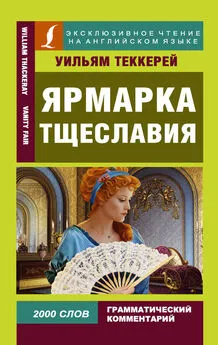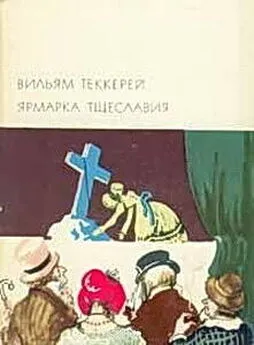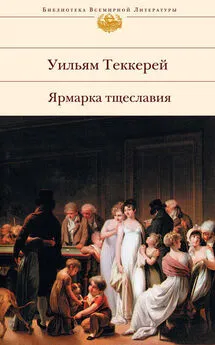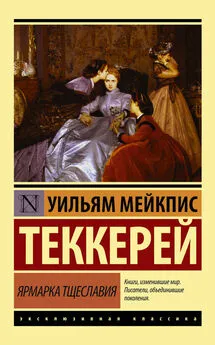Уильям Теккерей - Ярмарка тщеславия / Vanity Fair
- Название:Ярмарка тщеславия / Vanity Fair
- Автор:
- Жанр:
- Издательство:Литагент АСТ
- Год:2017
- Город:Москва
- ISBN:978-5-17-104403-9
- Рейтинг:
- Избранное:Добавить в избранное
-
Отзывы:
-
Ваша оценка:
Уильям Теккерей - Ярмарка тщеславия / Vanity Fair краткое содержание
Текст произведения незначительно адаптирован, снабжен грамматическим комментарием и словарем, в который вошли ВСЕ слова, содержащиеся в тексте. Благодаря этому книга подойдет для любого уровня владения английским языком.
Ярмарка тщеславия / Vanity Fair - читать онлайн бесплатно ознакомительный отрывок
Интервал:
Закладка:
Captain Dobbin couldn’t stay away from her troubles. He bought a piano at the auction and brought it to Amelia. He spoke to her and comforted her. Dobbin assured Amelia that the piano was the farewell present from Osborne.
Three days afterwards, Dobbin found Osborne in his room at the barracks.
“She – she’s sent me back some things I gave her. Look here!” There was a little packet directed in the well-known hand to Captain George Osborne, and some things lying about – a ring, a silver knife he had bought, as a boy, for her at a fair; a gold chain, and a locket with hair in it.
“It’s all over,” said he, with a groan of sickening remorse. “Look, Will, you may read it if you like.”
There was a little letter of a few lines, to which he pointed, which said:
My papa has ordered me to return to you these presents, which you made in happier days to me; and I am to write to you for the last time. Farewell. I pray God to strengthen me to bear this, and to bless you always. A. I shall often play upon the piano – your piano. It was like you to send it.
Dobbin was very soft-hearted. The idea of Amelia broken-hearted and lonely tore that good-natured soul. And he broke out into an emotion. He swore that Amelia was an angel.
“Where are they?” Osborne asked, after a long talk, and a long pause.
Dobbin knew. He had not merely sent the piano; but had written a note to Mrs. Sedley, and asked permission to come and see her. When Osborne heard that his friend had found her, he made hot and anxious inquiries regarding the poor child. How was she? How did she look? What did she say? His comrade took his hand, and looked him in the face.
“George, she’s dying,” William Dobbin said – and could speak no more.
Four hours after the talk between Dobbin and Osborne, the servant-maid came into Amelia’s room.
“Miss Emmy,” said the girl.
“I’m coming,” Emmy said, not looking round.
“There’s a message,” the maid went on. “There’s something – somebody – sure, here’s a new letter for you – don’t be reading them old ones anymore.” And she gave her a letter, which Emmy took, and read.
“I must see you,” the letter said. “Dearest Emmy – dearest love – dearest wife, come to me.”
George and her mother were outside, waiting.
When Captain Dobbin came back in the afternoon to these people – which he did with a great deal of sympathy for them – it did his heart good to see how Amelia had grown young again – how she laughed, and chirped, and sang familiar old songs at the piano, which were only interrupted by the bell from without proclaiming Mr. Sedley’s return from the City, before whom George received a signal to retreat.
Beyond the first smile of recognition Miss Sedley did not once notice Dobbin during his visit. [16] Кроме первой приветственной улыбки, Мисс Сэдли не уделила Доббину ни одного знака внимания в течение всего его визита.
But he was content, so that he saw her happy; and thankful to have been the means of making her so. Without knowing how, Captain William Dobbin found himself the great promoter, arranger, and manager of the match between George Osborne and Amelia. But for him it never would have taken place: he could not but confess as much to himself, and smiled rather bitterly as he thought that he of all men in the world should be the person upon whom the care of this marriage had fallen. He confirmed her father to give his consent to the marriage, he checked on Osborne and his affairs. He was content, so that he saw her happy; and thankful to have been the means of making her so.
10
While George Osborne’s good feelings, and his good friend and genius, Dobbin, were carrying back the truant to Amelia’s feet, George’s parent and sisters were arranging the splendid match for him, which they never dreamed he would resist: Miss Schwarz and her great fortune. Old Osborne thought she would be a great match, too, for his son. He should leave the army; he should go into Parliament; he should cut a figure in the fashion and in the state. This imperative hint disturbed George a good deal. He was in the very first enthusiasm and delight of his second courtship of Amelia, which was inexpressibly sweet to him.
Miss Schwarz did her best to appear in Russel Square. Whenever there was a chance of meeting George, that simple and good-natured young woman was quite in a hurry to see her dear Misses Osborne.
The day after George had his hint from his father, and a short time before the hour of dinner, he was in the drawing-room in a very becoming and perfectly natural attitude of melancholy. He came home to find his sisters there, and honest Swartz in her favourite amber-coloured satin.
The sisters began to play the piano. “Stop that thing,” George howled out in a fury from the sofa. “It makes me mad. You play us something, Miss Swartz, do. Sing something.”
“I can sing ‘Fluvy du Tajy,’” Swartz said, in a meek voice, “if I had the words.”
“O, ‘Fleuve du Tage, [17] «Река Тахо»
’” Miss Maria cried; “we have the song,” and went off to fetch the book in which it was.
Now it happened that this song, then in the height of the fashion, had been given to the young ladies by a young friend of theirs, whose name was on the title, and Miss Swartz saw “Amelia Sedley” written in the corner.
“Lord!” cried Miss Swartz, “is it my Amelia? Amelia that was at Miss P.’s at Hammersmith? I know it is. It’s her. Tell me about her – where is she?”
“Don’t mention her,” Miss Maria Osborne said hastily. “Her family has disgraced itself. She is never to be mentioned HERE.”
“Are you a friend of Amelia’s?” George said, bouncing up. “God bless you for it, Miss Swartz. Don’t believe what the girls say. SHE’S not to blame at any rate. She’s the best – ”
“You know you’re not to speak about her, George,” cried Jane. “Papa forbids it.”
“Who’s to prevent me?” George cried out. “I will speak of her. I say she’s the best, the kindest, the gentlest, the sweetest girl in England; and that, bankrupt or no, my sisters are not fit to hold candles to her. If you like her, go and see her, Miss
Swartz; she wants friends now; and I say, God bless everybody who befriends her. I say,” George said fiercely, “I thank everybody who loves Amelia Sed – ” He stopped.
Old Osborne was in the room with a face livid with rage, and eyes like hot coals.
“Miss Swartz, I love Amelia, and we’ve been engaged almost all our lives,” Osborne said to poor Miss Schwarz.
After dinner with a purple choking face, old Osborne then began. “How dare you, sir, mention that person’s name before Miss Swartz today, in my drawing-room? I ask you, sir, how dare you do it?”
“I’m a gentleman though I AM your son, sir,” George answered haughtily.
“I ain’t going to have any of this dam sentimental nonsense, sir,” the father cried out. “There shall be no beggar-marriages in my family. If you choose to fling away eight thousand a year, you take your pack and walk out of this house, sir. Will you do as I tell you, once for all, sir, or will you not?”
“Marry that woman? Never, Sir.”
Mr. Osborne pulled at the cord and almost black in the face, ordered to call a coach for Captain Osborne.
“I’ve done it,” said George, looking very pale.
“What, my boy?” says Dobbin.
George told what had passed between his father and himself. “I’ll marry her to-morrow,” he said with an oath. “I love her more every day, Dobbin.”
And so he did. There was nobody in the church besides the officiating persons and the small marriage party and their attendants. The rain came rattling down on the windows. In the intervals of the service you heard it, and the sobbing of old Mrs. Sedley. Osborne’s “I will” was sounded in very deep bass. Emmy’s response came fluttering up to her lips from her heart, but was scarcely heard by anybody except Captain Dobbin.
When the service was completed, Jos Sedley came forward and kissed his sister, the bride, for the first time for many months – George’s look of gloom had gone, and he seemed quite proud and radiant. “It’s your turn, William,” says he, putting his hand fondly upon Dobbin’s shoulder; and Dobbin went up and touched Amelia on the cheek.
11
Our young bride and bridegroom had chosen Brighton as the place where they would pass the first few days after their marriage. As they were coming into the hotel from a sea-side walk one afternoon, on whom should they light but Rebecca and her husband. The recognition was immediate. Rebecca flew into the arms of her dearest friend. Crawley and Osborne shook hands together cordially enough.
These two young couples had plenty of tales to relate to each other. The marriages of either were discussed; and their prospects in life canvassed with the greatest frankness and interest on both sides. George’s marriage was to be made known to his father by his friend Captain Dobbin; and young Osborne trembled rather for the result of that communication. Miss Crawley, on whom all Rawdon’s hopes depended, still held out. Unable to make an entry into her house in Park Lane, her affectionate nephew and niece had followed her to Brighton.
The two wedding parties met constantly in each other’s apartments. After two or three nights the gentlemen of an evening had a little piquet, as their wives sate and chatted apart. Jos Sedley arrived; so the three gentlemen walked down to have a stroll to the coach office.
“Hullo! there’s old Dobbin,” George cried, quite delighted to his old friend, whose promised visit to Brighton had been delayed until now. “How are you, old fellow? Glad you’re come down. Emmy’ll be delighted to see you,” Osborne said, shaking his comrade warmly by the hand and then he added, in a lower and agitated voice, “What’s the news? Have you been in Russell Square? What does the governor say? Tell me everything.”
Dobbin looked very pale and grave. “I’ve seen your father,” said he. “How’s Amelia – Mrs. George? I’ll tell you all the news presently: but I’ve brought the great news of all: and that is – ”
“Out with it, old fellow,” George said.
"We're ordered to Belgium. All the army goes – guards and all. We embark from Chatham next week." This news of war could not but come with a shock upon our lovers, and caused all these gentlemen to look very serious.
Dobbin was sent to the Osborne family to sound the news of the marriage. He came after some time but didn’t bring any good news. When George and Dobbin were alone, Dobbin took from his desk the letter which he had been charged by Mr. Osborne to deliver to his son. "It's not in my father's handwriting," said George, looking rather alarmed; nor was it: the letter was from Mr. Osborne's lawyer, and to the following effect:
“SIR,
I am commissioned by Mr. Osborne to inform you, and that in consequence of the marriage which you have been pleased to contract, he ceases to consider you as a member of his family. This determination is final.”
“Your obedient Servt [18] Ваш покорный слуга
., “S. HIGGS.
“P. S. – Mr. Osborne desires me to say, once for all, that he declines to receive any messages, letters, or communications from you on this or any other subject.
Читать дальшеИнтервал:
Закладка:








